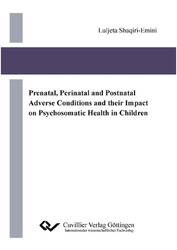| Departments | |
|---|---|
| Book Series (97) |
1381
|
| Nachhaltigkeit |
3
|
| Gesundheitswesen |
1
|
| Humanities |
2369
|
| Medienwissenschaften | 16 |
| Theology | 57 |
| Philosophy | 102 |
| Law | 423 |
| Economics | 851 |
| Social sciences | 417 |
| Sports science | 48 |
| Psychology | 233 |
| Educational science | 190 |
| History | 183 |
| Art | 111 |
| Cultural studies | 166 |
| Literary studies | 117 |
| Linguistics | 88 |
| Natural Sciences |
5408
|
| Engineering |
1795
|
| Common |
98
|
|
Leitlinien Unfallchirurgie
5. Auflage bestellen |
|
Advanced Search
Prenatal, Perinatal and Postnatal Adverse Conditions and their Impact on Psychosomatic Health in Children (English shop)
Luljeta Shaqiri-Emini (Author)Preview
Table of Contents, Datei (95 KB)
Extract, Datei (110 KB)
Various lines of research evidence have demonstrated that adverse pre-, peri- and postnatal life conditions might have negative influences on life stage neurodevelopment as well as on psychological and somatic health in children, adolescence and adult life. In particular, findings in children are still scarce and the etiological and maintaining underlying mechanisms are not fully understood. For this reason, we aimed to examine the influence of pre-, peri- and postnatal adverse conditions, such as prenatal stress, week of gestation, low birth weight and birth size on psychosomatic health as well as on psychosocial functioning in ten-year-old children. The main focus was on prenatal stress and its influence on birth outcomes and psychosomatic health between birth and the age of ten years.
Data I: Therefore, 96 ten-year-old children were investigated after being categorized into the groups of high, medium or low prenatal stress children. The categorization was based on the operational process considering two main prenatal factors: a complication-free pregnancy or the occurrence of preterm contractions and accordingly a risk of preterm birth and thus the administration of synthetic glucocorticoids. Glucocorticoid application serves to accelerate fetal lung maturation and consequently to prevent the newborn morbidity and mortality in cases of a childbirth before the 34th gestational week. Data analyses show significant group differences in the psycho-social level of functioning and psychological abnormalities. Perinatal outcomes seem to have no significant influence on children’s psychosocial status at age ten years. A total variance of 8.6% to 13.10% of the independent psychological variables is explained through pre- and postnatal adverse conditions. Furthermore, children with high prenatal stress have a near 8-fold higher risk of psychological abnormalities. Children with medium prenatal stress have an almost five times higher risk compared to children of the low prenatal stress group. Postnatal adverse conditions also lead to an up to 11-fold heightened risk of psychological abnormalities.
Data II: Further data analyses show that children with high and medium prenatal stress levels had lower gestational week, lower birth weight and birth size compared to children with low prenatal stress. No significant differences were found for somatic health indicators between birth and the age of ten years. Children with high prenatal stress experiences show lower diastolic blood pressure compared to children with low prenatal stress. No significant differences were found in systolic blood pressure and pulse pressure. Prenatal stress and lower birth weight seem to have a significant predictive value for blood pressure. Moreover, children with high prenatal stress reported experiencing significantly more headaches and abdominal pain, followed by children with medium prenatal stress, and finally children with low prenatal stress.
To conclude, prenatal stress might be an important but not sufficient factor in explaining etiology and maintenance of psychosomatic disorders. It seems more likely that the cooccurrence of adverse pre- peri- and postnatal life conditions, causing neurodevelopmental disturbances and programming maladaptive physiological patterns, might be responsible for health disparities in children, adolescents and in adult life.
| ISBN-13 (Printausgabe) | 395404093X |
| ISBN-13 (Hard Copy) | 9783954040933 |
| ISBN-13 (eBook) | 9783736940932 |
| Final Book Format | A5 |
| Language | English |
| Page Number | 166 |
| Lamination of Cover | glossy |
| Edition | 1 Aufl. |
| Volume | 0 |
| Publication Place | Göttingen |
| Place of Dissertation | Zürich |
| Publication Date | 2012-05-09 |
| General Categorization | Dissertation |
| Departments |
Philosophy
|








